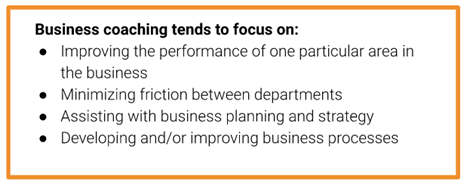
Business Coaching Services: Definition, Cost, and Benefits
Most organizations leverage some form of coaching. Leadership coaching programs have a proven positive impact on performance, well-being, coping skills, engagement, and attitude.
Business coaching is one type of coaching that tends to focus less on people and leadership skills, and more on business processes, performance, and strategy.
What is Business Coaching?
At the most basic level, business coaches help leaders improve the business so it can achieve its goals. Business coaches provide perspective on how to grow and run a business from their own knowledge and experience. Business coaching can take on many different flavors, depending on what the client needs.
 What Skills Do Business Coaches Bring To The Table?
What Skills Do Business Coaches Bring To The Table?
A business coach should be an expert on the systems, strategies, and processes required to grow your business. They should bring the perspective that comes with “working under the hood” of many different organizations. Every business has different problems it's trying to solve, but very few of the problems are wholly unique. Business coaches should come to the table with real experience helping solve common business problems, either as coaches or business leaders themselves.
Since a business coach’s goal is to improve the business and set it on a trajectory for success, the business coach must develop an intimate understanding of the inner workings of the organization. As such, even as the coach develops a relationship with the leader she’s coaching, that specific leader isn’t her client; her client is the business as a whole.
Most business coaches are external, meaning they’re not employed by their client organizations. This is by design, as much of the value of a business coach is in the “outsider” perspectives they can provide on problem areas and decisions to be made that are tough to see from within.
What Does a Business Coach Do?
According to Coaches Training Blog, a business coach “helps clients develop the necessary skills and obtain the appropriate tools and resources needed to operate a successful business entity.”
The content of business coaching sessions will vary based on the problems a client hopes to solve. But no matter the organization's size, geographic location, or target market, the core purpose of nearly every business is the same: developing, marketing, and selling products and services. As such, business coaching typically offers an educational component that differs from performance coaching or executive coaching. Business coaches often bring critical business knowledge and growth strategies to the relationship, like how to develop a robust business plan or create a compelling vision. Some business coaches even develop and teach their own frameworks and models to clients.
Sometimes business problems are actually people problems, so business coaches also help clients navigate complex relational dynamics that often show up in business settings. Skills in conflict resolution, giving constructive feedback, and delegation are just as important to business growth as a thoughtful strategy. In this way, business coaching may take on the flavor of leadership coaching in some instances.
Benefits of Business Coaching
Business coaching can benefit a wide variety of professionals, from first-time entrepreneurs to CEOs of Fortune 500 companies. Recipients of business coaching often learn valuable skills that can transfer to future business pursuits, which include:
- Strategic planning and visioning
- Goal-setting
- Achieving product-market fit
- Communication
- Team-building
- Productive conflict
Additionally, business coaching can lead to outcomes that benefit the entire organization, like:
- Improved culture
- Improved retention
- Improved customer satisfaction
- Increased clarity on the organization’s purpose
- Improved decision-making
- Higher productivity
- Improved relationships
Business Coaching vs. Executive Coaching
It’s easy to confuse business coaching with executive coaching, as the recipients of both types of coaching are typically C-suite business leaders, and the main goal of both types of coaching is to improve business performance. But the differences between the two are significant:
- Executive coaching focuses on the leader as an individual. Business coaching focuses on the organization as a whole. The goal of executive coaching is to improve the leader as a person in order to improve the business, while the goal of business coaching is to improve the business outright.
- Executive coaches work within the coachee’s personality, while business coaches work within the coachee’s business acumen.
- Executive coaches seek to maximize their coachee’s personal potential, while business coaches seek to maximize their coachee’s business’s potential.
- Business coaching is more educational than the question-centered one-on-one approach. Executive coaches aren’t teachers; their foundational philosophy is that their coachees already have the answers inside themselves, and their job as a coach is to help the coachee find them. In contrast, business coaches offer advice from past business experience and help coachees develop foundational business skills.
Steps for a Productive Business Coaching Engagement
Business coaching is an investment in the organization’s future. To maximize the potential for positive outcomes, here are five steps to “get the most” out of your business coaching engagement:
- Define the key business problems you’re seeking to solve. Maybe you’re struggling to adapt to changing market conditions, or one particular department is failing to pull its weight. Or perhaps the business lacks direction, and people are jumping ship as a result. You can’t solve problems you’re not aware of, and one of the secrets to a fruitful business coaching relationship is bringing intentional focus to these problem areas. Before you seek out a business coach’s help, spend some time defining the issues for which the business needs solutions in order to grow.
- Seek coaching candidates with relevant experience. Once you’ve defined 2-3 key problem areas, you can begin looking for coaches with experience helping other business leaders solve similar problems. Business experience should be a key factor in selecting a business coach. In addition to experience solving problems akin to yours, the ideal candidate is one with experience working with a number of other businesses in your industry.
- Interview candidates. Along with experience, it’s important to choose a business coach that you—and your executive team—are compatible with. Ask your top 3-5 candidates for a “get to know you” call where you can ask questions and learn more about their approach.
- Set goals. Once you choose a business coach with the right level of prior experience and good rapport, work with them to set goals for the coaching engagement. You’ll be better equipped to measure progress (and make a case for ROI) if you set goals upfront, so work with the coach to create goals that are attainable, yet impactful.
- Commit to the process with a growth mindset. Growth is uncomfortable, especially when confronting significant issues holding your business back. Business coaching is most productive when the leader is committed to growing and improving their business acumen, no matter the discomfort that arises as a result. That also means keeping coaching appointments, making time for “homework,” and showing up to appointments ready to learn.
One-on-One Vs. Group Business Coaching
Business coaching sessions can be held one-on-one or in a group setting. There are pros and cons to both approaches. The key benefits of one-on-one executive coaching lie in having the coach’s undivided attention and the deep partnership that can flourish as a result. With group coaching, on the other hand, coachees enjoy the benefit of a psychologically safe environment where they can talk, share, discover, and support each other. Group business coaching is particularly advantageous for leadership teams looking to learn alongside each other and improve team cohesion.
According to Harvard Business Review, business coaching in a group setting is particularly effective because it offers:
- Immersion into real-time group dynamics
- Insights from diverse perspectives
- Opportunities to practice new skills in a safe space
- A built-in accountability system
- A support network that will last beyond the coaching program
Cost of Business Coaching Services
Business coaching services come in many colors and flavors. With the ubiquity of technologies like video conferencing, leaders are no longer bound to their geographic location when it comes to finding the right business coach for their needs. Some business coaches run their own coaching practices, while others are employed by a larger organization with multiple coaches on staff. Some may also offer services that are adjacent to business coaching, like leadership training, management training, or consulting services.
Business coaching sessions can range in length from 1-2 hours and occur as frequently as the coachee’s schedule allows. Typical cadences include weekly, biweekly, or monthly sessions. The spectrum of costs for business coaching is wide. Most business coaches charge per hour, and like with most services, the cost will reflect the coach’s experience, the time investment required, and expected outcomes for the business. It’s worth noting, though, that the potential return on investment for business coaching is high.
Business Coaching + Executive Coaching
Don’t think of business coaching versus executive coaching as an “either-or” scenario. Both have the potential to drastically improve your business; they just do so in different ways. It’s common for senior leaders to work with both a business coach and executive coach. As the business coach educates them and guides them toward big decisions, an executive coach can help the senior leader drive strong people leadership through a time of change.



 What Skills Do Business Coaches Bring To The Table?
What Skills Do Business Coaches Bring To The Table?


